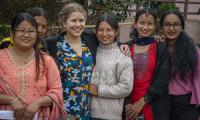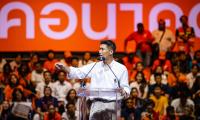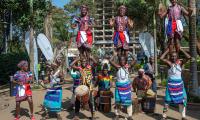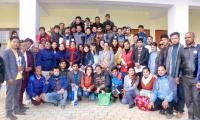The times are changing: more Nepalese youth are being put in charge
In recent years, there has been a change in attitude among Nepalese voters in favour of electing young politicians. A collaboration between Nepalese political parties, DIPD, and the Social Liberal Party of Denmark focuses on several initiatives to promote youth leadership in Nepal, and the youth are seizing the opportunity.

The inclusion of youth in leadership positions is one of the key issues in Nepal’s emerging democracy, as more than 40% of Nepal's total population is under the age of 40. Youth leaders from the major political parties argue that they should be given a chance to lead in politics. According to youth leaders, senior leaders have already had numerous opportunities to lead the country. It is now their turn to lead in accordance with the needs of the times.
In recent years, the debates on youth leadership have become stronger across political parties as well as among non-partisan youths in Nepal. And it is changing Nepal’s politics. People in Nepal are now more interested in putting younger people in charge, both in the parliament and in political parties:
"This is a very new trend. Previously, Nepalese voters preferred experienced leaders with a long history of fighting for democracy over young, inexperienced candidates. In Nepal, it is a part of the culture that elders are respected and trusted, making it more difficult for younger people to gain political power," according to DIPD’s country representative in Nepal, Shrishti Rana.
In public, the senior leaders, who benefit from their long legacy of democratic struggle, agree to improve the inclusion of youth in leadership positions. In practice, however, they are reluctant to hand over or share their power, in accordance with the trend in most countries around the world.
Youth in power
The local election in May 2022 marked, in many ways, a shift of power. Balen Shah, a 32-year-old independent candidate, was elected mayor of the capital, Kathmandu, defeating older candidates from two powerful parties. At the same time, 29-year-old Sunita Dangol won the position of Deputy Mayor. She was able to bag her candidature from the then-largest party, winning over other experienced candidates.
These two examples do not stand alone. More youth were elected to other positions, with 41% of all elected representatives in local elections now being youth. The May 22 election outcome was a surprise to many and marked great progress compared to previous local elections.
This trend continued in the national elections in November 2022. The youth-led Rashtriya Swatantra Party became the fourth-largest party in the parliament. Many of the party's MPs were under the age of 30. Shobita Gautam, a 28-year-old MP from the party, was named "One Young World Politician of the World" in 2023. Also, in other parties, young candidates defeated old and renowned leaders.
As a result, youth have now become a powerful force in Nepal’s parliament. The total number of MPs under the age of 45 in the national parliament is 63 out of a total of 275 seats. This is a great improvement compared to the election in 2017, where only 45 MPs were under the age of 45.
Partnership for multiparty culture among youth
DIPD started to work in Nepal more than a decade ago with the aim of strengthening the multiparty culture among the political parties in the country.

In 2019, the Danish Social Liberal Party and Nepalese parties launched initiatives that involved young political figures in multiparty politics. Nepal’s political parties welcomed the proposal and initiated several activities to promote youth leadership within political parties. One of those initiatives was promoting multiparty culture among youths in Nepal:
“As a youth leader, I was trained largely to compete with other political parties. After attending the multiparty trainings facilitated by DIPD and the Social Liberal Party, I learned that collaborating with other parties is also an option. This was helpful during the COVID times when I needed to mobilise support from other parties to tackle the pandemic in my ward.” Sunil Dangol, a former elected representative, explained.
One of those initiatives was promoting multiparty culture among youths in Nepal, and as a result, a group of youth leaders has formed a multiparty committee to strengthen a collaborative, cross-political culture among young people. The committee meets on a regular basis to discuss democratic and political issues. They create different dialogue and debate sessions for youth.
As popular support for young leaders grows, this work has increased the multiparty culture among Nepalese youth and generated more youth political involvement and representation.
Contact us


Strengthening Multiparty Democracy in Nepal
DIPD cooperates with JOMPOPS in creating platforms for cooperation among Nepal’s major parties



